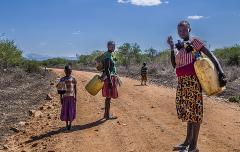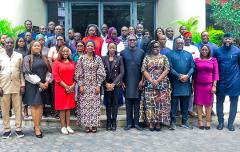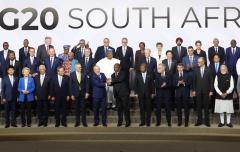Business as usual is not enough to achieve Sustainable Energy for All
21 April 2016 - At the margins of the General Assembly’s High-Level Thematic Debate on Achieving the Sustainable Development Goals, a distinguished group of government, private sector, international organization and civil society leaders gathered to discuss how to achieve Sustainable Energy for All. The event was hosted by IRENA and SEforALL at the UN in New York.
Ms. Rachel Kyte, the CEO of SEforALL and Special Representative of the Secretary-General for Sustainable Energy for All, stressed the importance of energy as a front loaded goal that enables most of the other SDGs. For this reason, she said, Sustainable Development Goal 7 on energy needs to be reached early – way before 2030. She challenged all participants to imagine what it would mean to close the energy access gap within the next ten years.
Mr. Adnan Amin, the Director-General of IRENA, stressed the remarkable drop in prices of renewable energy technology in recent years. He cited examples of renewable energy deployment already happening, including with IRENA involvement in countries like the Maldives and Saint Vincent and the Grenadines.
Many of the participants highlighted that the 2030 Agenda for Sustainable Development, the Sustainable Development Goals and the Paris Agreement will all depend on the advancements of the energy transition over the next 15 years.
Mr. Jeremy Oppenheim, Founder and Managing Partner, SystemiQ and programme chair of the New Climate Economy, explained that the change has already started to happen. "Massive expansion of renewables in Intended National Determined Contributions (INDCs) is a unique step forward but not sufficient to limit the rise in global temperature to well below 2°C. The Energy Transitions Commission is committed to this goal and has brought together diverse interests in energy, industry, government and NGOs to accelerate change towards zero-carbon energy systems that enable robust economic development and limit the rise in global temperature to well below 2°C".
The ETC has evaluated many of the INDCs to the Paris Agreement and will issue a report about its findings in due course. Mr. Ajay Mathur, the Director-General of The Energy and Resources Institute (TERI) acting as ECT Co-chair agreed that the INDCs are no doubt a very important contribution, but not enough to get well below the 2°C degree target. As part of their presentation, both speakers made clear that business as usual will not suffice and that all countries will have to help to achieve the energy transition.
Many of the interventions mentioned the global goals in the context of the climate agreement. Ms. Mary Robinson, former President of Ireland and SEforALL Advisory Board member, stressed the importance of climate justice for the poorest as the world continues to strive for energy transition.
For more see the ETC Position Paper and INDC Assessment



